|
3-4 London Road (and Chapel Place)
Royal Tunbridge Wells
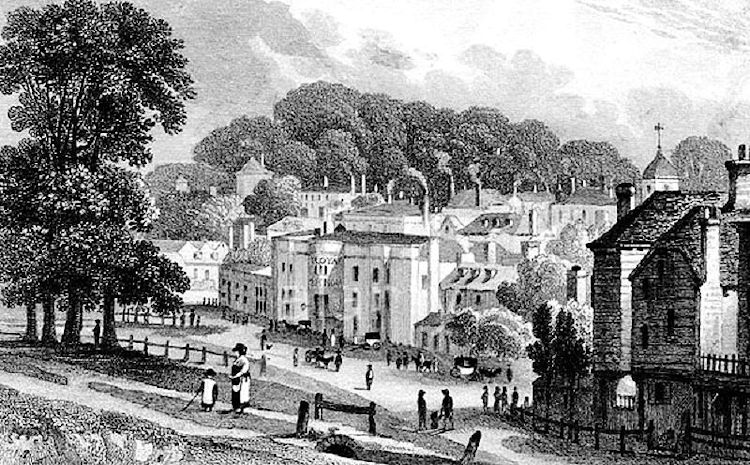
Above drawing 1825. |
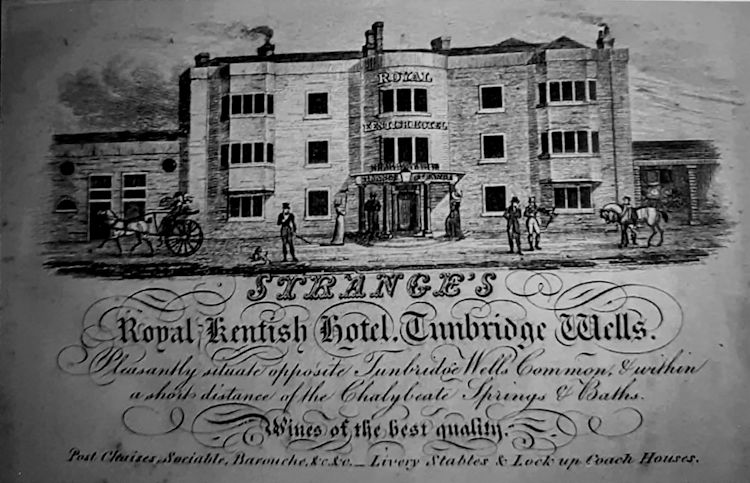
Above picture, circa 1825. |
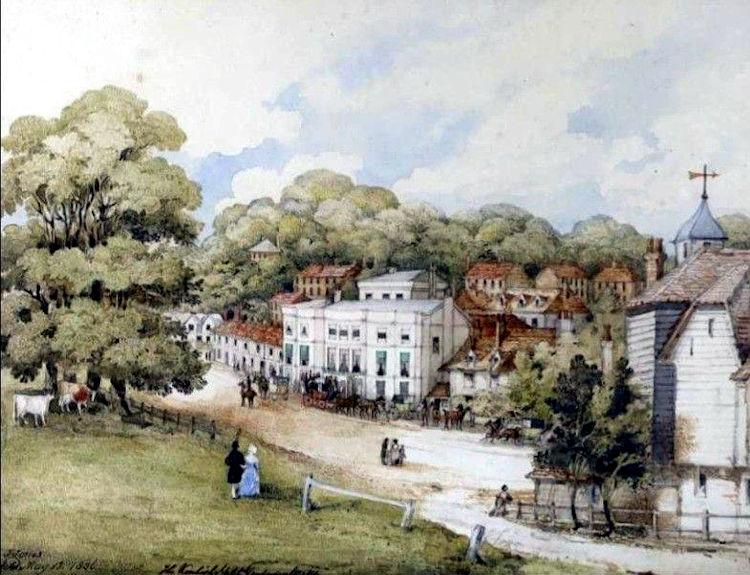
Above painting dated 12 May 1836 by J. Jones. |
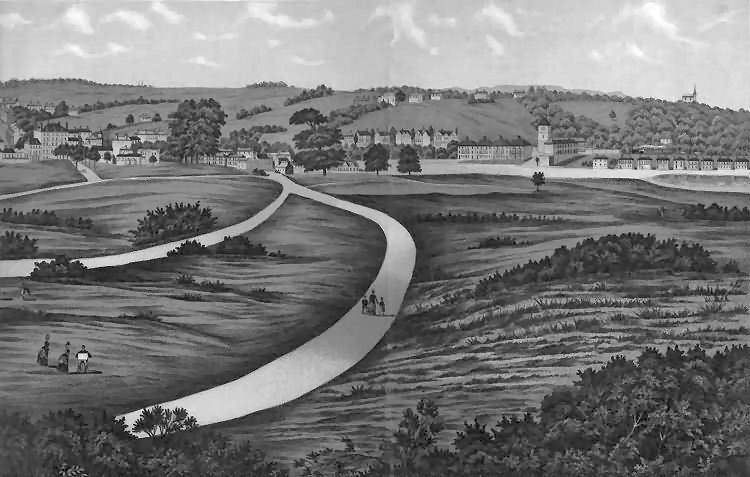
Above picture showing the hotel and station from the common 1889. |
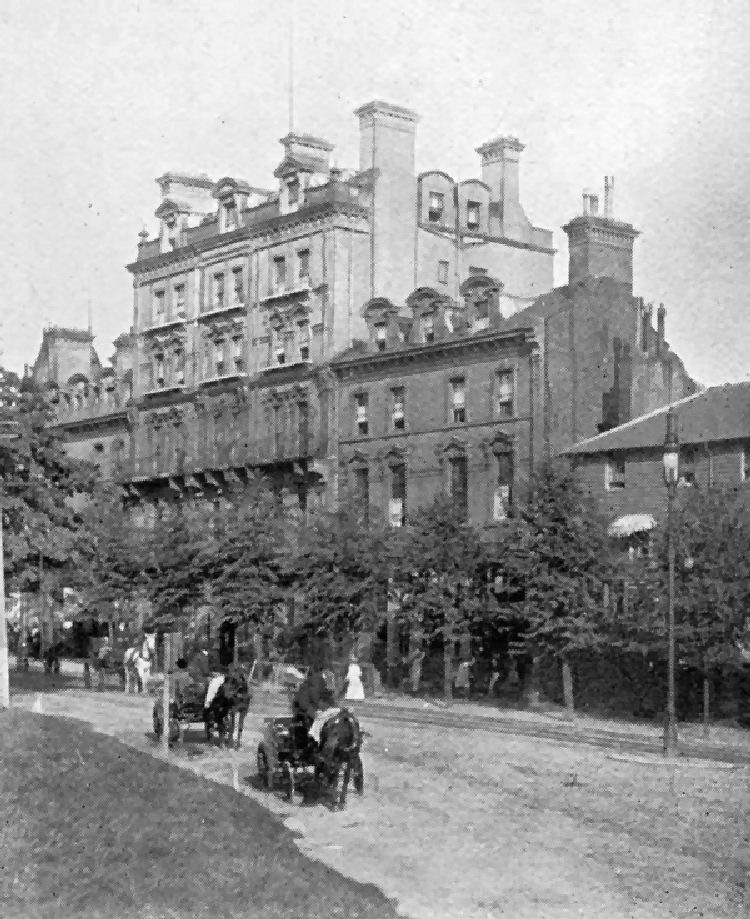
Above photo, 1896, by kind permission of Peter Macleod. |
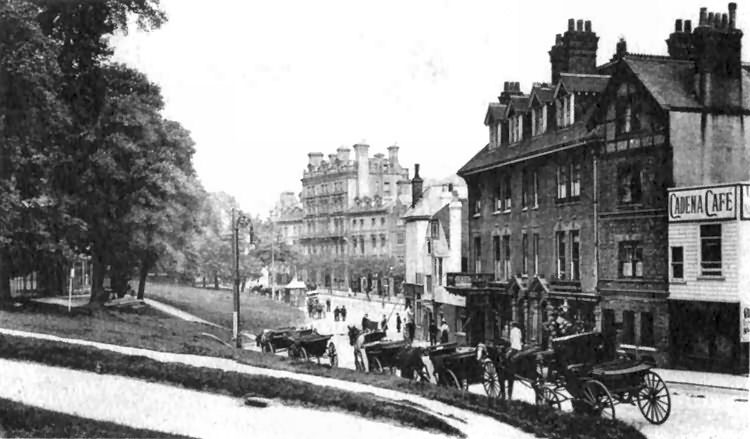
Above photo, 1910, by kind permission of Peter Macleod. |
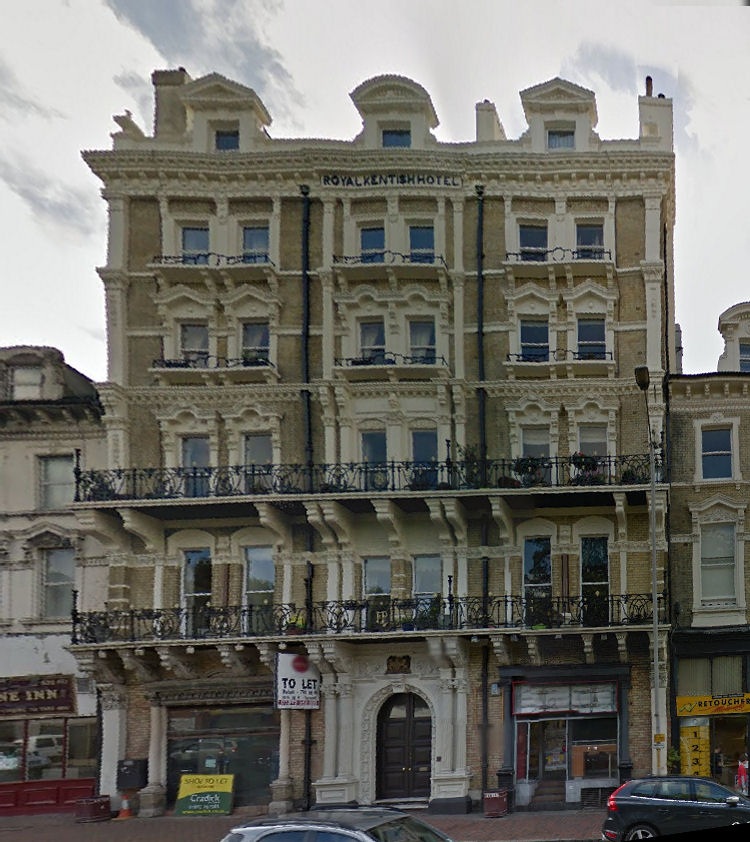
Above image from Google maps, August 2012. |
Originally called the "Angels"
the premises changed name to the "Kentish" date as yet unknown but certainly
between 1801 and 1946. Also known as the "Royal Kentish Hotel."
From Clifford's descriptive guide of Tunbridge Wells of 1827, Strange's
"Royal Kentish Hotel," recently built on the site of the "Angel
Hotel," became the "Grand Hotel," now the site of Kentish Mansions.
Edward Strange - the founding father, took over the running of the huge
lodging house on Mount Sion known then as Green Pales - now as Sion House -
in 1779. He and his hard-working wife had 12 children. Huge though the house
is, there must have been major problems when the summer guests arrived.
Their son Thomas, born in 1769, played in the first recorded cricket game
with full score: September 13th 1790, Brighton v. Tunbridge Wells on
Brighton level. The family interest in cricket continued down the
generations as we found two cricket team and score cards dated 1851 and 1860
amongst the ephemera. Another son Edward Hilder, born in 1772, ran the
"Kentish Hotel" which was known in early days as the "Angel."
He, like his father, was very successful but had a mere nine children. We
came across an account of a Meeting of the Proprietors of the Walks Estate,
dated May 31st 1827 at the "Duke
of York's Tavern." They added their signatures to an agreement to allow
Edward Jeffery Strange (son of Edward Hilder) to build on a room at the back
of his shop on the Pantiles. It was his ever-growing family that moved into
Nevill Lodge Which became the family home until its demolition in 1948.
Charles Matthew Strange, born in 1838, built the Pump Room, on the site of
what is now Union Square, and rebuilt the "Kentish Hotel" - his
grandfather's old business. He also enlarged the family firm to become
'Strange Electrical' with shops all over Kent and Sussex.
|
From The Morning Post (London, England), Monday, March 29, 1825.
ROYAL KENTISH HOTEL, TUNBRIDGE WELLS.
JANE STRANGE, respectfully
returns her thanks to the Nobility and Gentry, visiting Tunbridge Wells,
for the distinguished favours conferred on her since the death of her
Husband, and begs to state that she has lately made considerable
improvements in the Hotel, with a view to comfort and convenience,
trusting that she will be favoured with a continuance of the patronage
and support she has hitherto experienced.
|
|
Brighton Gazette, Thursday 26 August 1830.
ROYAL KENTISH HOTEL, TUNBRIDGE WELLS.
Mrs. Strange returns thanks to the Nobility and Gentry, visitors of
Tunbridge Wells, for the patronage she has hitherto experienced; and
begs respectfully to state that she has lately made a considerable
improvements in the Hotel, (which is pleasantly situated opposite the
Common) with a view to render it more commodious; and it shall be her
endeavour by assiduity and good management to retain their kind support.
Posting with good horses and steady drivers. Stages to London from the
Hotel, morning and afternoon.
|
|
From The Essex Standard, and Colchester and County Advertiser (Colchester, England), Saturday, October 29, 1831; Issue 43.
MARRIAGE.
25th inst. at Tonbridge, Kent, by the Rev. Dr. Knox, Mr. T. Durrant,
jun. of the "Crown and Magpie Tavern, Aldgate High-Street, to Sophia,
youngest daughter of the late Mr. Edward Hilder Strange, of the "Royal
Kentish Hotel," Tunbridge Wells. |
|
From the Maidstone Gazette and West Kent Courier, 6, December, 1831.
Lease of Valuable Hotel, Posting House, Lucrative Tap, &c. &c. Tunbridge Wells.
To be sold by auction, by Mr. Cockrell in conjunction with Mr. Henshaw,
at Garaway's on Wednesday, the 21st of December, 1831, at 12 o'clock, by
order of the Executors, of Edward H Strange, Deceased.
The lease, 19 1/4 years of which will be unexpired at Christmas 1831, of
the flourishing establishment at that fashionable and pleasant watering
place, Tunbridge Wells, known by the name of "Strange's Royal Kentish
Hotel," situated on the High Road, and facing the beautiful Common, and
consists of the Hotel and Tavern, lately repaired and fitted up at
considerable expense, and making up about 50 beds.
Excellent Coach House, for the standing of 12 to 16 carriages, and good
stall stabling for 20 horses. commodious and distinct premises opposite
the Hotel, for the Post Horses, Chaises, &c.
A very lucrative and increasing Tap business to which is attached a
respectable Weekly Corn Market.
The Funeral Furnishing Business which has been successfully and
respectfully conducted by the family for upwards of 50 years.
The premises, which might be still enlarged and improved, present an
imposing appearance, having about 170 feet of frontage.
The concern was successfully carried on by the late Proprietor Mr. E. H.
Strange, and equally so since his decease, by his Widow, in consequence
of whose death, the Executors offer it to public competition for the
benefit of the family, as it presents unusual advantages to any
competent persons who may engage in it.
The premises may be viewed twenty one days prior to the sale, and
particulars and descriptive plans may be had on the premises; of Mr.
Young, Tunbridge Wells, Executor; Mr. Stapley, Tunbridge Wells; Mr.
Cockerell, Blackman Street, Southwark; Mr. Henshaw, Duke Street, West
Smithfield; T. S. Newnon, Esq. Solicitor, 2, Great Carter Lane; Mr.
Crease, 53, West Smithfield, Executor; at Garroway's, and at the
principle Inns throughout Kent and Sussex.
|
|
From the South Eastern Gazette, Tuesday 5 June 1832.
Tunbridge Wells.
The King's birthday was celebrated here on the 23rd ult by a public
dinner at the "Royal Kentish Hotel," on which occasion upwards of 70 of
the resident gentry and inhabitants sat down to a sumptuous repast,
consisting of turtle, venison, and every delicacy of the season, to
which ample justice was done by one and all, who express themselves
highly delighted with a treat, and the particular attention paid to them
by Mr. E. Churchill, the new landlord of the hotel. Great praise also
was bestowed on the wines, which were served as samples of what were
contained in the cellars. R. W. Bleancowe, Esq. took the chair,
supported on his right by Sir William Geary, and on his left by William
Cougreve, Esq. On the cloth being removed all charged to the first
toast - "The King," with three times three, which was drunk with
enthusiasm, and followed by "God save the King," which was sung in a
fine style. The chairman then gave "The Queen," with three times three.
The following were then toasted in succession "The Duchess of Kent,"
"The Princess Victoria," and "The Duke of Sussex," with three times
three. "The Army and Navy," "The Lord Lieutenant of the County," The
Officers and Privates of the Tunbridge Wells Troop." Sir William Geary's
health was then drunk, and "Success to the Oxonhoath Troop." After
several other toasts (which were received with repeated cheers) the Rev.
J. J. Saints proposed the health of Mr. Bleaklowe, who returned thanks
in a neat speech., which he concluded by anticipating the most congenial
to the feeling of every inhabitant - "Prosperity to Tunbridge Wells."
This toast was drunk with three times three. Mr. B. Then left the chair;
the party, however, did not break up till a late hour. A brilliant star,
composed of lamps, was fixed in front of the hotel, which was very
attractive. The furze on our beautiful common, we will get to say was
set fire to late at night - it is a great pity that some steps are not
taken to preserve one of the greatest ornaments to that place.
|
|
South Eastern Gazette, Tuesday 16 December 1834.
Worship Street.
On Thursday, Anne Smith, a very stylishly dressed young woman, and Mary
Crawford, a middle-aged woman, who described herself as married, were brought before Mr. Grove,
by Hanley, an officer of the
establishment, the former charged with having robbed Mr. Edward
Churchill, the proprietor of the "Royal
Kentish Tavern," Tunbridge Wells, during the time she had been employed
in his service as barmaid, of
property to the very considerable amount, and the latter with being the
receiver of the same, well knowing
it to have been stolen.
The prisoners were only apprehended late on Wednesday afternoon, and in
consequence of several
important witnesses not being in attendance, the evidence was not gone
into in detail, but, from what
transpired before the magistrates to authorise him to detaining the
prisoners in custody, it appeared that
Smith had been in the employ of the prosecutor as bar-maid and principal
servant, about 12 months, but
had left about of week since, in consequence of her being rather
intimate with the head waiter.
Shortly after the prisoner had left, the prosecute and missed a quantity
of valuable plate, and that led him
to inspect and examine his other property, and he then discovered a
system of extensive plunder had been
carried on for some considerable time. Suspicion immediately fell on the
prisoner, and the prosecutor made
enquiries respecting her, and ascertained, at the booking office at
Tunbridge Wells, that she had been in
the habit, for about 9 months, of sending parcels of various sizes, and
sometimes boxes, to London, two or
three times a week, directed to "Mrs. Crawford (the other prisoner),
West Place, Fox Lane, Kingsland Road."
The prosecutor, on gaining this information, directly came to town, and
made known the circumstance of
his office, and on Wednesday afternoon Hanley, the officer, accompanied
him to a house in West Place, and
there apprehended both the prisoners, and, on searching the premises,
found an immense quantity of tea,
sugar, soap, candles, a quantity of bed furniture, together with a great
many bottles of wine, brandy, and
gin, and other property, all of which Hanley conveyed away, and produced
in his office before the
prisoners.
Mr. Churchill swore to the candles, soap, and the greater part of the
bed furniture. The latter was marked
with his name in full, and "Royal Kentish Tavern," T Wells. The candles
were a peculiar make, and the soap
was stamped "Williams, London."
The prisoners were remanded.
|
|
From the Kentish Gazette, 1 August 1837.
CRIMINAL COURT.
Charles Townsend was indicted for having stolen in June a coat, value
7s. from Samuel Waghorn, hostler of the "Kentish Hotel,"
Tonbridge Wells. The prosecutor deposed that on the 13th of June he hung
up the jacket in question behind the stable door; that
he saw it hanging there on the 17th instant, and missed it subsequently.
On Sunday week he came to Maidstone, and saw the
garment on the back of the prisoner, who was at the "Bull Tap." It had
been washed, and the skirts cut off. The prisoner, in his
defence, stated that he had taken the coat without knowing it to be the
prosecutor’s, whilst working at Tonbridge Wells; that
hearing that there would be plenty of work in Maidstone this week he
wore it, but with the intention of taking it back again.
Three months' imprisonment and hard labour.
|
|
Kentish Journal and Kentish Advertiser, Tuesday 22 October 1844.
The Auctioneer begs particularly to remind those gentlemen who wish to
improve their stocks, that this is an opportunity
which seldom occurs in this part of the country, and that Vouchers will
be put into the hands of the purchases of each Lot,
and the pedigree of each animal will be given in catalogues to be had at
the "Star Inn," Maidstone; "Crown," Sevenoaks;
"Kentish Hotel," Tunbridge Wells; "White Hart," Ashford; "George,"
Folkestone; "Star," Lewes; "George," Robertsbridge;
"White Hart," Reigate; "Greyhound," Croydon; also of Mr. Stidolph,
Dartford, and at the office of the Auctioneer, High Street
Tonbridge.
The stock and effects maybe viewed any day previous to the sale.
|
|
South Eastern Gazette, 10 April, 1860. Spotted Dog
PENSHURST, KENT.
Freehold Beer-house, Grocer’s Shop, Butcher’s Shop, Furniture
Warehouse, Dwelling-house, and Cottages, on Smart's Hill.
Messrs, CHARLTON WILL SELL by AUCTION, at the "Crown Hotel,"
Tonbridge, on Tuesday, the 17th of April, 1860, at Three for Four
o’clock, the following Property, in two lots:—
Lot 1. That desirable BEER-HOUSE, GROCER’S SHOP, FURNITURE
WAREHOUSE, three COTTAGES, outbuildings and garden ground, with a
pump and well of excellent water, in the occupation of Mr. Frederick
Hardwick and his under-tenants.
Lot 2. A BUTCHER’S SHOP, DWELLING-HOUSE, two COTTAGES, and garden
ground as stumped out, adjoining the last lot, in the occupation of
Mr. James Still, Thomas May, and John Adams.
Particulars and conditions of sale may be had fourteen days
previously, at the "Leicester Arms," Penshurst; "Crown," Tonbridge
and Sevenoaks; "Kentish Hotel," Tonbridge Wells; of Messrs. Carnell,
Gorham, and Warner, Solicitors, Tonbridge; or of Messrs. Charlton,
Auctioneers and Estate Agents, Tonbridge.
|
|
South Eastern Gazette, 15 May, 1860.
Detaining Weights and Measures.
At the Petty Sessions, yesterday week, Mr. John Stringer, inspector
of weights and measures, was charged with misconduct in the
execution of his duty, by Mr. Haines, of the "Kentish Hotel." Mr.
Cripps appeared in support of the summons. The charge was for
illegally retaining certain measures, the property of Mr. Haines. It
appeared that Mr. Haines sent certain measures, which were used for
odd purposes, to the defendant, with instructions to stamp them if
found correct, and if not correct to return them, and he would smash
them up for old pewter. Two or three of the measures the inspector
refused either to stamp or return. The bench dismissed the case, but
cautioned the inspector against detaining measures or weights sent
to him.
|
|
From the Whitstable Times and Herne Bay Herald, 19 May 1860. Price 1d.
Detaining Measures and Weights.
At the Petty Sessions on the 6th inst, Mr. John Stringer, inspector of
weights and measures was charged with misconduct in the execution of his
duty, by Mr. Haines, of the "Kentish Hotel." Mr. Cripps appeared in
support of the summons. The charge was for illegally detaining certain
measures, the property of Mr, Haines. It appeared that Mr. Haines sent
certain measures, which were used for odd purposes, to the defendant,
with instructions to stamp them if found correct, and if not correct to
return them, and he would break them up for old pewter. Two or three of
the measures the inspector refused either to stamp or return. The bench
dismissed the case, but cautioned the inspector against detaining
measures or weights sent to him.
|
|
South Eastern Gazette, 6 November, 1860.
TUNBRIDGE WELLS. A Singular Present.
Recently Mr. Haines, the landlord of the "Kentish Hotel," received
from some unknown person twenty handsomely and strongly bound copies
of the New Testament and Psalms, got up in the best style,
accompanied with the following notice:-
London, September, 1860. Dear Sir, — Having spent a pleasant time in
your respectable and well-conducted hotel, I beg your acceptance of the accompanying tokens of my best wishes, believing their contents
will afford instruction and comfort to many a wearied traveller.
|
|
Kent Times, 25 January 1862.
Petty Sessions, Monday, January 20th. Before J. Deane, Esq., (in the
chair). W. Eles, W. C. Morland, and C. J. Fisher, Esqrs.
A Mistake Souch v. Pollington.
The complainant in this case is a blacksmith and landlord of the
"Duke of York" public-house in this place, and also a farmer at Crowborough. The defendant, for whom Mr. Cript, solicitor,
appeared, is book-keeper at the "Kentish Hotel" Coach office, in
this place.
The defendant was charged in the summons with having on the night of
the 14th inst., used abusive and insulting words towards the
plaintiff, calculated to create a breach of the peace.
Complainant deposed:- I am a blacksmith, and landlord of the "Duke
of York" public house in this place. A little before 12 o'clock on
the night in question I told defendant I wished to have my house
cleared; he called for half a pint of brandy, which I refused to
draw, and he refused to go. He was in company with others; some one
fastened the parlour door on the inside. He said "we were not
everybody, and he could tell us something we would not like to
hear." He afterwards shook his fist in my wife’s face, and after
some altercation called me a b--- b---. I then turned him out of
doors, on which he said I should hear of this another day.
Crom examined by Mr. Cripps:— I had given Mr. Haines’s men two
shillings and sixpence to spend. I am sure he shook his fist in my
wife's face. When be railed me a b--- b--- he was on the steps
outside the door; it was after I had turned him out of my house.
There were five or six more in company with him. There were some
women there. They were loose women, but I do not encourage loose
women there. They sometimes come to the bar, are supplied with what
they call for and go away.
Mrs. Souch gave corroborative evidence, adding that defendant said
if the other Mrs. Souch, or the right Mrs. Souch had been there she
would have drawn the brandy.
William Everest, pot-boy to plaintiff, was examined but no
additional evidence was elicited.
Mr. Cripps briefly addressed the bench, intimating that plaintiff
had given Haines men 2s. 6d. to drink, as a Christmas gift, and as
was usually the case on such occasions the men agreed to add
something to the gift, and enjoy themselves. Everything was
conducted in a quiet manner till the brandy was called for as a
parting glass, when some words took place, and the defendant, being
turned out of the house, he certainly did make use of some
expletive, but he was a young man of good character as he should be
able to show in evidence, and had always conducted himself with
propriety having the time he had been in his situation, which was
upwards of twelve years, and he contended that the language imputed
to defendant under the circumstances did not come within the meaning
of the Act.
Mr. Cripps called a witness who was present on the occasion, but the
chairman said the bench was of opinion, that from the evidence
already heard the case must be dismissed.
|
|
Kent Times, 7 June 1862.
A drunken and indecent fly driver.
TUNBRIDGE WELLS. Petty Sessions. Town Hail, Monday. Before W. C.
Morland, Esq., (Chairman), Capt Fisher, A. C. Ramsden, J. Field,
James Deane, and W. Elera, Esqrs.
Edward Bates was charged with drunkenneas, riotous and indecent
behaviour, on the 24th of May. Mr. W. C. Cripps appeared to
prosecute in behalf of the commissioners; Mr. Andrew was for the
defendant.
Sergeant Westbrook deposed:— On the 24th of May I went to enquire
into an accident at the back of the Parade, caused as I thought, by
two horses running away. I saw the defendant about ten minutes
afterwards. He took one of the horses away. He was the worse for
liquor.
Mr. W. Haines, of the "Kentish Hotel," said:— The defendant was in
my employment up to the 24th of May. On that day he drove a lady and
gentleman to Gravesend. When he returned about ten o'clock in the
evening I saw him. He appeared to be intoxicated, and was very
abusive. This was in the Hotel. He afterwards came into the yard and
I turned him out. The accident happened about half-past nine, and I
saw him about five minutes afterwards, he was three years in my
employment and was frequently intoxicated.
Cross-examined:— When I saw him I charged him with being drunk. He
made use of low expressions in reply. The accident caused about £40
damage to me. I was angry with him. He has not made a complaint to
me about the horses. They are very quiet horses.
Mr. J. Edonard, perfumer. Parade, said:- I recollect the accident
alluded to, and saw the defendant immediately afterwards. He was not
sober. I asked him if he was hurt, and he made a very indecent
reply.
Police-constable Stowell, who saw the defendant soon after the
accident, also corroborate! the evidence as to his drunkenness.
Mr. Haines, in reply to the bench, said the defendant returned from
Gravesend an hour and a half before he was expected.
Mr. Andrew said the defendant was quite sober, and the horses ran
away.
Mr. Philpot said:- On the day named I saw the defendant abont nine
miles from Gravesend, on his return to Tunbridge Wells. He was then
perfectly sober. I had a conversation with him, about five minutes,
in front of an inn. I left him at the inn. I did not see him doing
anything.
Wm. Goble, Southborough, said:- I saw the defendant come through
that village in the evening named. At the top of the hill there the
horses were coming at the rate of about four miles an hour, and it
was then 20 minutes or half-past nine. I heard the horses make a
plunge at the bottom of the hill, and they went at a rapid rate as
they passed me. The driver managed them very well. I did not see him
touch them with the whip. When I saw him he was trying to stop them.
Richard Jeffery, bricklayer, who saw the accident occur, said he
believed the defendant fell between the horses. He should think such
a fall would "turn" any one. The defendant was not drunk, and he did
not hear him use any bad language. The driver led one of the horses
away.
Police-constable Judges said he saw the defendant lead one of the
horses away. He did not think that if he had been drunk he could
have led horse away as he did.
Cross-examined:- I consider a man drunk when he is helpless. The
defendant was, I believed the "worse for liquor."
The defendant was fined 10s., with costs, 17s; in default to be
imprisoned for 21 days; he was allowed 14 days for payment.
|
|
From the Kent and Sussex Courier 6 June, 1873. Price 1d.
TUNBRIDGE WELLS THE ROYAL KENTISH HOTEL
(Under entirely new Management)
Has been Re-decorated and Re-furnished throughout.
Ladies and gentlemen boarded on the most reasonable terms, and
special arrangements made with families.
Luncheons, Dinners, &c.,on the shortest notice.
Weddiing breakfasts Supplied.
J. BRABY Proprietor.
|
|
From the Kent and Sussex Courier 6 June, 1873. Price 1d.
Royal Kentish Hotel BILLIARD SALOON.
This spacious Room, adjoining the Hotel, which has been enlarged,
re-decorated, and elegantly fitted up, and which contains TWO
MAGNIFICENT NEW TABLES, is open daily, and gentlemen visiting the rooms
may rely on meeting with every accommodation they may require. JOHN BRABY, Proprietor.
|
|
From the Kent and Sussex Courier, 1 August, 1873.
TUNBRIDGE WELLS. THE ROYAL KENTISH HOTEL,
(Under entirely New Management)
Has been Re-decorated and Re-furnished throughout.
LADIES AND GENTLEMEN BOARDED ON THE MOST REASONABLE TERMS, AND SPECIAL
ARRANGEMENTS MADE WITH FAMILIES.
Luncheons, Dinners, &c . on the shortest notice- WEDDING BREAKFASTS
SUPPLIED.
J. BRABY. PROPRIETOR.
|
|
From the Kent and Sussex Courier, 19 June 1874.
Tunbridge Wells Petty Sessions. Unstamped Measures.
Mr. Braby, of the "Royal Kent Hotel," was summoned for having four
unstamped measures in his possession at the "Kentish Tap." The
circumstances were precisely the same as in the preceding case, the
measures, which were new, being quite correct as regards size, but
deficient of a stamp.
Mr. T. Foreman, manager of the tap, who represented Mr. Braby, said that
they had recently had four dozen new measures from a firm in Sheffield,
and the makers had, from some cause or other, neglected to stamp those
produced.
The chairman said Mr. Braby must settle the matter with the Sheffield
house, and, while acquitting him from anything in the shape of fraud,
they were bound to convict, and they fined him 4s. and 10s. 6d. costs.
|
|
From the Kent and Sussex Courier, 22 July 1874.
Tunbridge Wells Petty Sessions. Extension of One Hour.
An extension of 1 hour for keeping open the "Royal Kentish Hotel," after
the usual time was granted to Mr. Braby, on the occasion of the Farmers
Club half-yearly dinner, on the 24th inst.
|
|
From The Morning Post (London, England), Wednesday, June 24, 1885.
TUNBRIDGE-WELLS. - ROYAL KENTISH HOTEL.
The largest and best appointed
in Tunbridge-wells. Moderate charges. Under new management. Tariff and
boarding terms of the proprietor, J. R. Cleave. |
Jane Strange was also licensee of the "Market
House" in 1828.
LICENSEE LIST
STRANGE Edward Hilder to 1825 dec'd
STRANGE Jane (widow) 1828-30+

CHURCHILL Edward 1832-34+ 
CROPLEY Henry 1841+ (superintendent age 25 in 1841 ) )
WATTS Albert J 1851+ 
PRUDENCE Peter 1858-61+

HAINES William 1860-62+
 
STUCKEY Charles 1871+ (age 43 in 1871 ) )
BRABY John 1873-74+

MONEY Sarah J 1881-June/83 (age 35 in 1881 ) )
WEEKS & HUGHES June/1883+

CLEAVE J R 1885+
KELSEY James 1891+  (Manager)
(Manager)
PARZEN Louis 1901+ 
https://pubwiki.co.uk/KentishHotel.shtml
 From the Pigot's Directory 1828-29 From the Pigot's Directory 1828-29
 From the Pigot's Directory 1832-33-34 From the Pigot's Directory 1832-33-34
 Whitstable Times
and Herne Bay Herald Whitstable Times
and Herne Bay Herald
 Kent
and Sussex Courier Kent
and Sussex Courier
 Census Census
|






